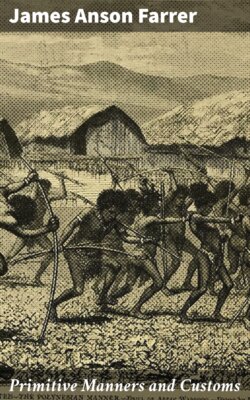Primitive Manners and Customs

Реклама. ООО «ЛитРес», ИНН: 7719571260.
Оглавление
James Anson Farrer. Primitive Manners and Customs
Primitive Manners and Customs
Table of Contents
INTRODUCTION
I. SOME SAVAGE MYTHS AND BELIEFS
II. SAVAGE MODES OF PRAYER
III. SOME SAVAGE PROVERBS
IV. SAVAGE MORAL PHILOSOPHY
V. SAVAGE POLITICAL LIFE
VI. SAVAGE PENAL LAWS
VII. EARLY WEDDING CUSTOMS
VIII. THE FAIRY-LORE OF SAVAGES
IX. COMPARATIVE FOLK-LORE
Footnote
Отрывок из книги
James Anson Farrer
Published by Good Press, 2021
.....
So much, then, being premised as to the nature of the evidence on which our knowledge of the lower races depends, and as to the limits within which such evidence may be received and its veracity tested, let us proceed to examine some of the higher beliefs of savages, which, as they bear some analogy to the beliefs on similar subjects of more advanced societies, are in a sense religious, and, so far at least as the collected information justifies us in judging, seem of indigenous and independent growth.
Few results of ethnology are more interesting than the wide-spread belief among savages, arrived at purely by their own reasoning faculties, in a creator of things. The recorded instances of such a belief are, indeed, so numerous as to make it doubtful whether instances to the contrary may not have been based on too scant information. The difficulty of obtaining sound evidence on such subjects is well illustrated by the experience of Dobritzhoffer, the Jesuit missionary, who spent seven years among the Abipones of South America. For when he asked them whether the wonderful course of the stars and heavenly bodies had never raised in their minds the thought of an invisible being who had made and who guided them, he got for answer that of what happened in heaven, or of the maker or ruler of the stars, the ancestors of the Abipones had never cared to think, finding ample occupation for their thoughts in the providing of grass and water for their horses. Yet the Abipones really believed that they had been created by an Indian like themselves, whose name they mentioned with great reverence and whom they spoke of as their ‘grandfather,’ because he had lived so long ago. He was still, they fancied, to be seen in the Pleiades; and when that constellation disappeared for some months from the sky they would bewail the illness of their grandfather, and congratulate him on his recovery when he returned in May. Still, the creator of savage reasoning is not necessarily a creator of all things, but only of some, like Caliban’s Setebos, who made the moon and the sun, and the isle and all things on it—
.....